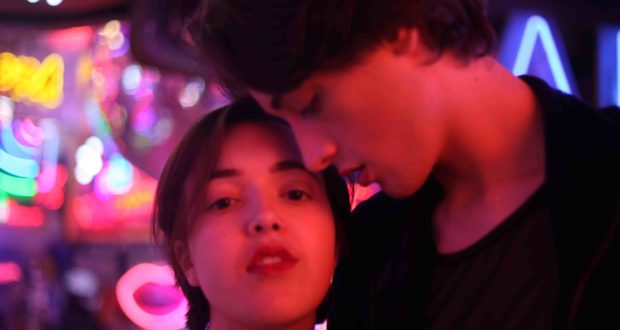Pros: Visually and verbally mesmerising. A psychedelic take on the Greek tragedy Iphigenia in Aulis, which combines audiovisual broadcast and enigmatic live performance with highly imaginative but obscure results.
Cons: Too long and too allegorical to be accessible to the general audience.
Summary
Rating
Good
OBIE award-winner Caridad Svich’s play was inspired by Euripides’ tragedy Iphigenia in Aulis, written in 405BC. This in turn was based on the Greek epic tale of King Agamemnon, who sacrifices his daughter Iphigenia to appease the goddess Artemis and allow his troops to join the battle against Troy. In Iphigenia in Aulis, the title role has a surprisingly marginal impact on the unfolding of the plot; Svich’s drama aims to restore balance by placing Iphigenia at the very centre of the scene, keeping her on stage throughout the performance.
The Brechtian influence in Iphigenia (A Rave fable) is the German playwright’s theory for an epic theatre, where the performance is seen as a means of shaping reality, rather than reflecting it.
This all converges in Clumsy Bodies’ debut production, which is committed to providing space for those with disabilities or impairments, actors of colour, the LGBTQIA community. In their current casting, Iphigenia (Jess Rahman-Gonzalez) and Achilles (Sam Kindon) are played by non-binary and deaf actors.
The solid performance delivered by the entire cast is supported by a mesmerising design. Simple glow sticks are combined to mark out a fluorescent central aisle that leads to the stage. Video projections with catastrophic time-lapse images are echoed by strings of words, however the evocative effect is doomed by the shoddy quality of the recorded voices and the exacting length of the play.
The predominantly allegorical dialogues and lack of significant action on stage would benefit from a more succinct running time to preserve the momentum of its metaphorical impact. Currently, the result is a long and obscure play where the audience is called to pick the bones out of the different motives and is, ultimately, in contrast with the principles of accessibility actively promoted by the company. Nonetheless, Iphigenia (A Rave Fable) is an interesting piece of work with some fascinating elements of originality and a strong political message against the exploitation of women and their bodies.
Author: Caridad Svich
Director: Oli Smith
Producer: Clumsy Bodies Theatre
Booking Information: This show has now completed its London run and will be at the Edinburgh Festival Fringe on 4, 5, 7 and 12 August 2017.
 Everything Theatre Reviews, interviews and news for theatre lovers, London and beyond
Everything Theatre Reviews, interviews and news for theatre lovers, London and beyond



